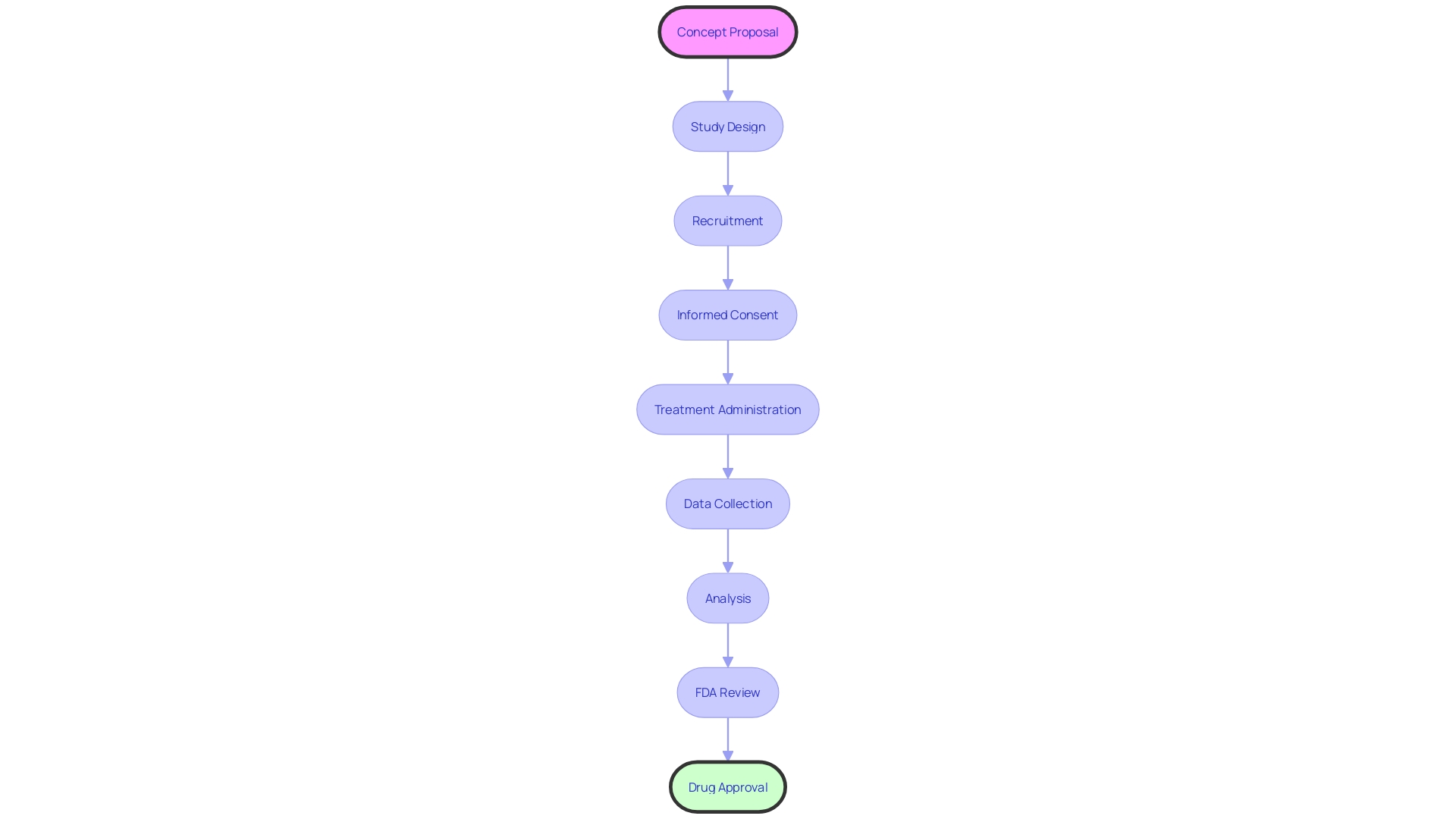Introduction
Clinical trials play a crucial role in advancing medical knowledge and validating new medical innovations. From pharmaceuticals to therapeutic procedures, these trials aim to test the efficacy and safety of new interventions while offering hope and potential cures for patients with limited options.
However, there is often a gap between the narrow focus of randomized controlled trials (RCTs) and the complexities of real-world clinical practice. To bridge this divide, experts advocate for a more integrated approach in trial design.
Additionally, the process of finding and qualifying for clinical trials has evolved, with online services facilitating the search based on disease stage and location. Despite the associated costs, such as travel expenses, clinical trials have significant importance in the medical landscape, reinforced by the rigorous standards for FDA drug approval.
The critical role of clinical trial consultants is highlighted in successful trial implementation. These consultants contribute to the meticulous design of trial protocols, adherence to regulatory guidelines, and efficient management of trial operations.
Engaging the services of a clinical trial consultant can elevate the effectiveness and precision of medical research endeavors. Consultants bring expertise in navigating the regulatory framework, streamlining processes, and addressing challenges posed by geographic and knowledge disparities. However, clinical trial consultants also face challenges in managing the ever-changing regulatory landscape and diverse stakeholders involved in trials. Despite these challenges, their ability to facilitate clear communication and employ strategic project management is essential in ensuring compliant and accessible trials. Overall, clinical trials and the role of consultants are instrumental in advancing medical science and delivering new treatments to those in need.
The Importance of Clinical Trials in Advancing Medical Knowledge
Clinical trials are the pivotal steps in validating medical innovations, from novel pharmaceuticals to cutting-edge therapeutic procedures. Take, for instance, a patient in rural Pennsylvania with an ultra-rare condition that lacks FDA-approved treatments. Presented with an opportunity to join a clinical trial in Turkey, the patient faces the daunting task of navigating international travel complexities, from securing visas to handling unfamiliar paperwork.
Such scenarios underscore the patient-centric approach of clinical trials, which aim not only to test the efficacy and safety of new medical interventions but also to offer hope and potential cures to those with limited options. Clinical trials represent the bedrock upon which modern medicine is built. They are systematic, investigational studies where volunteers participate to assess new medical treatments or strategies.
The process begins when an investigator or a company proposes a novel concept, rigorously comparing it with existing standards of care. This methodical approach is key to achieving incremental improvements in medical practice, ultimately enhancing patient outcomes. The entire process is carefully orchestrated, keeping the perspectives of physicians, patients, and communities at the forefront.
Despite the 40,000 clinical trials registered annually, a discrepancy persists between the narrow focus of randomized controlled trials (RCTs) and the complexities of real-world clinical practice. As highlighted in a special communication in JAMA, this gap can lead to inefficiencies and limitations in the scope and impact of trials. To bridge this divide, experts advocate for a more integrated approach, aligning trial design with the practicalities of patient care.
Moreover, the process of finding and qualifying for clinical trials has evolved, now facilitated by online services that streamline the search based on disease stage and location. Yet, patients must be cognizant of the associated costs, such as travel expenses and time away from work, even as the treatments within trials are provided at no additional charge. The significance of clinical trials in the medical landscape is further reinforced by the rigorous standards for FDA drug approval, which, as Kaplan notes, have recently adapted to expedite access to potentially life-saving treatments.

Case Study: Successful Implementation of a Clinical Trial Consultant in a Medical Research Study
The critical role of clinical trial consultants was highlighted in a recent study for an innovative treatment of a rare genetic disorder. Their contribution was multifaceted, including the meticulous design of the trial protocol, adherence to stringent regulatory guidelines, and the adept handling of the trial's operations.
A clinical trial's success hinges on the precise formulation of the research question, which lays the groundwork for the study. By controlling both independent and dependent variables and selecting an appropriate control group, consultants are able to mitigate biases and confounding factors, ensuring the reliability of the data collected.
For instance, the challenges faced by a patient from rural Pennsylvania needing to travel to Turkey for a clinical trial accentuate the complexities involved in trial participation. These complexities underscore the necessity for patient-centricity in clinical trials, as emphasized by Daniel J Herron, who advocates for inclusivity and clear communication with patients. Clinical trials, which are instrumental in establishing the safety and efficacy of new treatments, are structured in phases to meticulously evaluate both the safety and the effectiveness of interventions. As such, the consultant's expertise is indispensable in navigating the logistical, ethical, and procedural nuances that contribute to the integrity and success of these vital medical research endeavors.

Benefits of Collaborating with a Clinical Trial Consultant: Expertise and Efficiency
Engaging the services of a clinical trial consultant can substantially elevate the effectiveness and precision of medical research endeavors. Such consultants bring a wealth of knowledge to the table, particularly when it comes to the intricate regulatory framework that clinical trials must navigate.
With a firm grasp on the latest regulations and guidelines, consultants play a pivotal role in maintaining the study's compliance from start to finish. Moreover, their seasoned experience in trial management can streamline processes, from refining study designs to improving participant recruitment and data collection techniques.
These enhancements are crucial for producing outcomes that are both accurate and dependable, which is the cornerstone of advancing medical science and patient care. Additionally, consultants can address the challenges posed by geographic and knowledge disparities, aiding in bridging the gap between patients and healthcare providers.
This is particularly important in scenarios where patients, such as those in rural areas or those facing rare diseases, are presented with the opportunity to participate in clinical trials that might be located abroad or in distant urban centers. By assisting in the coordination of logistics and offering clarity on clinical trial processes, consultants can make such life-saving research more accessible. As Ken Getz from PHARMAVOICE notes, the industry is continually innovating to balance scientific rigor with efficient operations, supported by technologies like electronic data capture. These efforts are vital in enhancing the overall efficacy and efficiency of clinical trials, ultimately contributing to the acceleration of medical breakthroughs and the delivery of new treatments to those in need.
Challenges Faced by Clinical Trial Consultants and Strategies for Overcoming Them
Clinical trial consultants are pivotal in bridging the gap between medical research advancements and the practical challenges of executing studies. They navigate a labyrinthine regulatory landscape that is in constant flux, requiring them to assimilate new guidelines and tailor their methodologies to remain compliant.
Moreover, these consultants act as the linchpin in managing a diverse array of stakeholders - from researchers and sponsors to ethics committees and participants. Consider, for example, a patient from rural Pennsylvania with a rare disease for which there is no FDA-approved treatment.
They are presented with the chance to join a clinical trial in Turkey, a venture that could save their life. However, this opportunity is riddled with logistical hurdles, such as acquiring visas, handling foreign documents, and coordinating international travel. These complexities underscore the need for clinical trial consultants to possess not only a robust understanding of regulations but also a keen ability to facilitate clear communication and employ strategic project management. By doing so, they ensure that trials are not only compliant but also accessible to those who stand to benefit most from groundbreaking medical research.
Conclusion
Clinical trials are pivotal in advancing medical knowledge and providing hope to patients with limited treatment options. The gap between randomized controlled trials (RCTs) and real-world clinical practice can be bridged through a more integrated approach in trial design, aligning it with patient care. Clinical trial consultants play a critical role in successful trial implementation.
They contribute to meticulous protocol design, regulatory compliance, and efficient operations. By controlling variables and selecting appropriate control groups, consultants ensure reliable data collection. Engaging a clinical trial consultant enhances the effectiveness and precision of medical research.
Their expertise in navigating regulations, streamlining processes, and addressing disparities contributes to compliant and accessible trials. However, clinical trial consultants face challenges in managing changing regulations and diverse stakeholders. Effective communication and strategic project management are essential for ensuring compliant trials.
In summary, clinical trials drive medical science forward and deliver new treatments to those in need. Clinical trial consultants play a vital role in navigating complexities, maintaining compliance, and facilitating clear communication among stakeholders. Their expertise improves the efficacy of clinical trials, contributing to medical breakthroughs that benefit patients globally.




